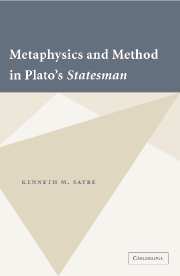Book contents
- Frontmatter
- Contents
- Acknowledgments
- Introduction
- PART I METHOD
- 1 Becoming Better Dialecticians
- 2 Collection in the Phaedrus and the Sophist
- 3 Division in the Phaedrus and the Sophist
- 4 Collection Yields to Illustrative Paradigms
- 5 The Weaver Paradigm
- 6 The Final Definition
- PART II METAPHYSICS
- Appendix: Equivalents for the Great and the Small in Aristotle and His Commentators
- Bibliography
- Index Locorum
- Index of Names
- General Index
4 - Collection Yields to Illustrative Paradigms
Published online by Cambridge University Press: 23 November 2009
- Frontmatter
- Contents
- Acknowledgments
- Introduction
- PART I METHOD
- 1 Becoming Better Dialecticians
- 2 Collection in the Phaedrus and the Sophist
- 3 Division in the Phaedrus and the Sophist
- 4 Collection Yields to Illustrative Paradigms
- 5 The Weaver Paradigm
- 6 The Final Definition
- PART II METAPHYSICS
- Appendix: Equivalents for the Great and the Small in Aristotle and His Commentators
- Bibliography
- Index Locorum
- Index of Names
- General Index
Summary
Platonic Uses of the Term παράδειγμα
Use of παράδειγμα in the standard sense of example can be found throughout the corpus. In the Apology, Socrates suggests that the oracle's pronouncement about none surpassing him in wisdom is a matter of singling him out as an example (παράδειγμα: 23B1) to illustrate the wisdom of recognizing one's own ignorance. In the Phaedrus, he cites his speeches on love as providing an example (παράδειγμα: 262D1) of how a knowledgeable orator can mislead his audience; in the Philebus, he alludes to examples (παραδείγματα: 13C8) of pleasures being at odds with one another; and so forth.
While there is nothing idiosyncratic about Plato's use of παράδειγμα in the sense of example, there is another use of the term in several middle and late dialogues that is distinctly Platonic. For example, Socrates declares in the Republic that the philosophic rulers shall look upon the Form of the Good as a pattern (παραδείγματι: 540A9) for the right ordering of the state. At Theaetetus 176E3, he speaks of patterns (Παραδειγμάτων) of happiness and misery as making a stand in reality. Timaeus, in his namesake dialogue, identifies “patterns that are intelligible and always the same” (παραδείγματος … νοητὸν καὶ ἀεὶ κατὰ ταῦτὰ ὄν: 48E5–6). And the youthful Socrates, at Parmenides 132D1–2, expresses confidence in Forms as patterns (παραδείγματα) fixed in nature. As each passage makes clear in its own way, the term παραδείγματα in this second sense serves as an alternative designation for Forms or Ideas.
- Type
- Chapter
- Information
- Metaphysics and Method in Plato's Statesman , pp. 73 - 91Publisher: Cambridge University PressPrint publication year: 2006



